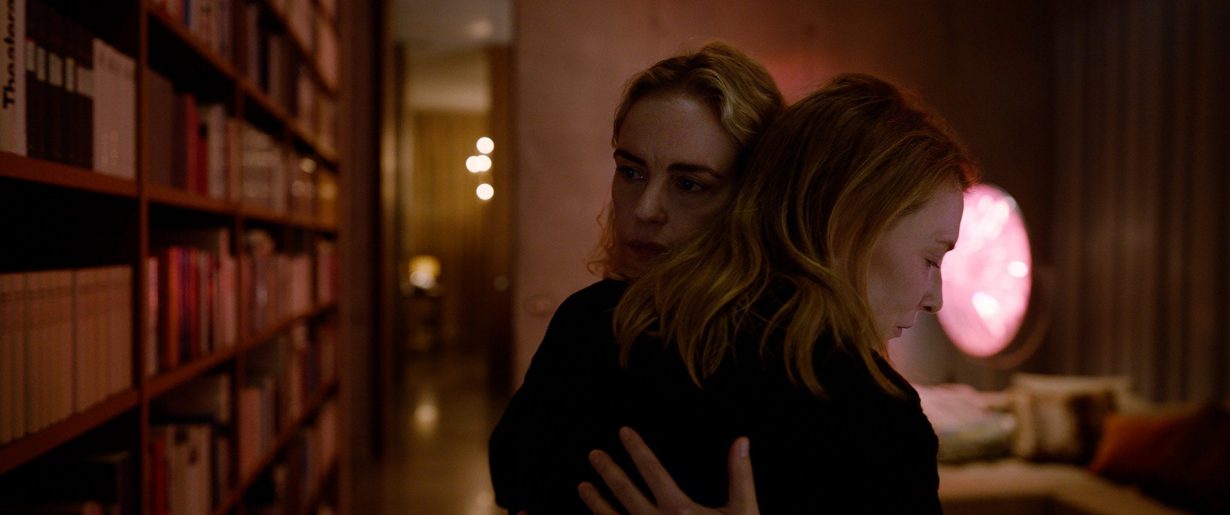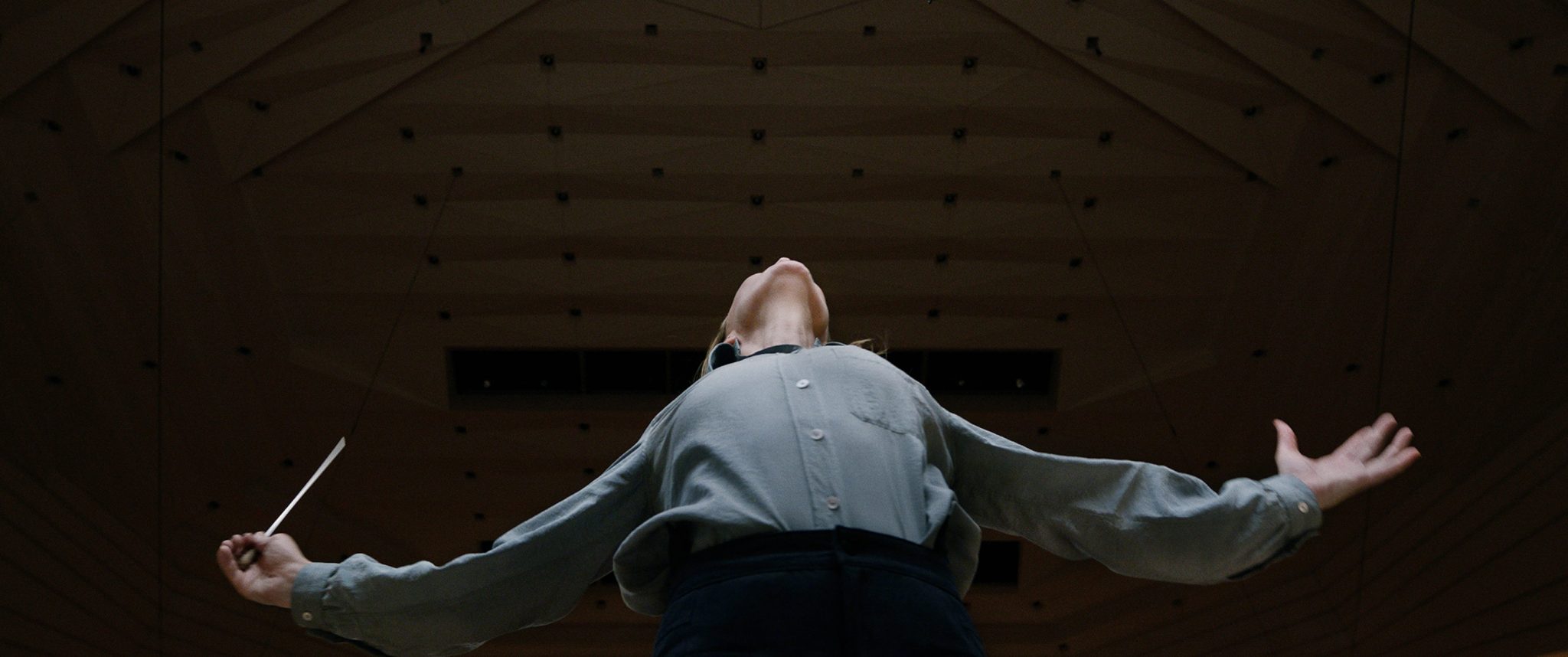The surreality of Todd Field’s film shares something with its titular conductor: the shifting, unreliable impression she makes on the girls she uses for pleasure and advancement
One of the biggest inconveniences when writing about international releases like Todd Field’s Tár (2022) is the fact that by the time the film receives a cinematic run in the UK, the ‘Discourse’ will already have spun several cycles on its themes, and its plot will have been spoiled by Twitter screenshots. Tár is about, or ‘about’, cancel culture and sexual exploitation in the workplace, and as such it felt entirely guaranteed to launch a thousand contradictory thinkpieces from the moment it first screened last year in Venice. It is also a film built around these subjects which does not present itself as a one-sided message movie, and few things seem to provoke the ire of the internet more than a story about the dynamics of sexual power without total moral clarity.
It has not helped, either, that Lydia Tár, the titular world-famous (and fictional) conductor whose embarrassing fall from grace the film depicts, is not only the recipient of an EGOT and the former protégé of Leonard Bernstein, but the wearer of some of the hardest fits in recent cinematic history. When I complained to an American friend who saw the movie months ago that I feared watching it in case I was too late to have an original thought, he responded with an image cribbed from Instagram: a degraded screenshot of Cate Blanchett as Lydia Tár, looking stricken, overlaid with cry-laughing emojis and the caption ‘BRUH.’
Bruh, indeed – what can there possibly be left to say about Tár, in critical terms, now that its central character has become a reaction meme? Plenty, as it happens, not least because Field’s elegant, sometimes spooky, often very funny portrait of a genius in decline is in my estimation a genuine masterpiece, blending pianissimo human drama with bombastic, gothic touches of the implied supernatural every bit as smoothly as Olivier Assayas’s 2016 Personal Shopper. As far as plot is concerned, there is not much to summarise: Lydia Tár, an intellectual celebrity with sexual charisma up the wazoo, starts out on top of the world and then, once she is revealed in slow drips of poisonous information to be a bona fide sexual predator, begins to topple off it.

Mood, and not narrative, is the innovation here; the story plays what is colloquially referred to as ‘second fiddle’ to the swooning, sometimes sickening boldness of the movie’s fluctuating tone. It is crucial that the audience finds Lydia’s brilliance believable, and it is also just as crucial that we believe in her effortless ability to seduce many beautiful young women. Happily, Blanchett, with her long and handsome face and radiant quickness, is not simply equal to the task, but nearly overqualified – her Lydia is almost too appealing to dismiss. I dare you not to fall in love with her when she performs a spot-on burlesque of Glenn Gould at her piano, even if her little pantomime is followed by a lecture that tips over into the least sexy kind of cruelty.
Sticking closely to his antiheroine even when she is being especially antiheroic, Field is unafraid to run the risk of being accused of sympathising with a monster, and viewers and critics have certainly been divided as to whether Tár has come to praise its central character, or bury her. Such disagreements have been further fuelled by the shift Tár makes in its last hour, when the film becomes a horror story in which normal logic is not quite discarded, but not fully maintained, either. Certain scenes behave like cryptic clues, and a number of these scenes feel as if they have come from an entirely different movie: Lydia walks into a derelict building and finds herself face-to-face with a mysterious black dog; she falls down and cracks her face against the pavement, and the sound of it is louder than a gunshot; a metronome begins ticking by itself in her apartment, and a shadowy female figure seems to linger; screams emanate from the woods; she commits an act of public violence; she is forced to take a job that is so ludicrous, so laughable, that it feels as if it can’t possibly be real. The suicide of one of Lydia’s victims can be seen as one possible explanation for the way Tár shakes apart and begins to resemble a haunted house, allowing for the presence of a malevolent ghost – another take, as proposed by Dan Kois over at Slate, is that these scenes are presented to us as they play out in the haunted house of Lydia’s head.
The loose surreality and somnambulant quality of Tár’s final act does lend some credence to the latter theory, and it does seem obvious that what we see is not entirely factual. I would argue, though, that there is another reading of the movie which makes sense of the transition, and that it has less to do with Lydia’s perception of the world than it does with the shifting, unreliable impression she makes on the girls she uses for her pleasure and advancement, then discards. Supposing you – in this scenario, a pretty and preternaturally talented young woman – were to find yourself enamoured with a dazzling and charismatic older genius, and that as improbable as it may seem, that dazzling and charismatic older genius appeared to love you back. Would the intoxicating warmth of her personal interest, like a spotlight that confirmed your specialness, not heighten your perception of her as a godlike figure, cinematic in her movements and near-superhuman in her brilliance? This is the Lydia Tár we see in the first half of Field’s film, and the effectiveness of her seduction – of the audience as well as of her pupils – relies on the elegance and sensuality of Blanchett’s crisp performance. Suppose, then, that at some point this dazzling, charismatic older genius tired of you and then dropped you, or worse, chose to sabotage your work so that your professional paths were never going to cross again. If the betrayal did not kill you, would you not begin to see your former lover-mentor in a different kind of light? Might she seem pathetic to you? Might you cease to see her as a goddess, and instead begin to see her as a shadowy creature to be hunted, haunted and humiliated? Such is the Lydia of the last hour of the movie: cowed, stripped of her powers, injured and embarrassed, a hysteric, and above all else alone.

If Lydia’s fall seems too exaggerated to be genuine, not least because sexual predators rarely face drastic consequences in real life, it might be easier to accept as the projection of a fantasy about revenge. (Do note: we first see her onscreen through the iPhone lens of her latest protégé, and shortly afterwards she’s shown from the perspective of another of her victims, who is in the audience of her talk for the New Yorker.) Then again, perhaps this is a crackpot theory; perhaps I have fallen victim to the urge to ‘solve’ Field’s film, as if I am scripting a YouTube video entitled TÁR ENDING EXPLAINED. Certain things in life are far too complex to be explicable by straightforward logic – genius, for instance, which was once thought to be given by the gods, and which can scramble all our senses with its rarity and grace; or beauty, which can have the same effect. When a film produces cycle after cycle of discussion, it is sometimes because it is engineered to push specific buttons, but it is also occasionally because the film is in effect a living thing: a picture of such intrigue and intelligence that it can mean numerous things at once. A little ambiguity, if the work is good enough, can be bracing rather than frustrating.
Case in point: a lesbian with a wife, Lydia Tár is presented as a woman with what might be perceived as masculine qualities. She refers to herself as the “father” of her child; she wears androgynous suits, tailor-made to mirror the ones worn by her male idols; she is shown to be largely disinterested in conversations about gender, and is unfamiliar with the concept of International Women’s Day; the only friend who sympathises with her predicament as a serial harasser is an older man. At times, I wondered if Field meant to imply that power and influence, being seen as traditionally male attributes in especially patriarchal fields, necessarily confer a certain masculinity on women who acquired them, as if Lydia had somehow defected to the winning team – a complicated proposition, since lesbians are not simply ‘like men,’ even when they have adopted characteristics that society sees as male.
With a lesser film, I might have let my inability to pin down exactly what was being said about the interplay between power and gender get the better of me, and I might have seen the work as incomplete. Here, I simply let the mystery be, trusting that Tár did not need to have a perfect message to provide me with what turned out to be a more-or-less-perfect cinematic experience. In this regard, an ambiguous film of such quality can provide the viewer with a similar opportunity to the one Lydia describes when she refers to reinterpreting a score in accordance with a mood, the story altering as the person who translates it teases out their chosen meaning – a love song played as a fugue; a concerto reimagined as a weapon of seduction; a life story that shifts tempo, suddenly prestissimo, to become a hysterical ghost story, instead.
